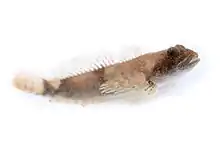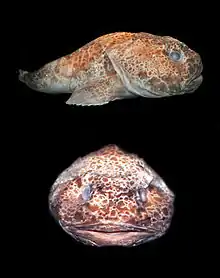| Sculpin | |
|---|---|
 | |
| Myoxocephalus octodecemspinosus | |
| Scientific classification | |
| Domain: | Eukaryota |
| Kingdom: | Animalia |
| Phylum: | Chordata |
| Class: | Actinopterygii |
| Order: | Scorpaeniformes |
| Suborder: | Cottoidei |
| Superfamily: | Cottoidea Gill, 1889[1] |
A sculpin is a type of fish that belongs to the superfamily Cottoidea in the order Scorpaeniformes.[2] As of 2006, this superfamily contains 7 families, 94 genera, and 387 species.[3]
Sculpins occur in many types of habitat, including ocean and freshwater zones. They live in rivers, submarine canyons, kelp forests, and shallow littoral habitat types, such as tidepools.[2]
Sculpins are benthic fish, dwelling on the bottoms of water bodies. Their pectoral fins are smooth on the upper edge and webbed with sharp rays along the lower edge, a feature that makes them specialized for gripping the substrate. This design helps the fish anchor in fast-flowing water.[2] The sculpin normally grows to about four inches long.[4]
Families and subfamilies
- Jordaniidae Starks, 1895
- Rhamphocottidae Jordan & Gilbert, 1883
- Scorpaenichthyidae Jordan & Evermann, 1898
- Agonidae Swainson, 1839
- Hemilepidontinae Jordan & Evermann, 1898
- Hemitripterinae Gill, 1856
- Bothragoninae Lindberg, 1971
- Hypsagoninae Gill, 1861
- Anoplagoninae Gill, 1861
- Brachyopsinae Jordan & Evermann, 1898
- Agoninae Swainson, 1839
- Bathyagoninae Lindberg, 1971
- Cottidae Bonaparte, 1831
- Cottinae Bonaparte, 1831
- Comephorinae Bonaparte 1850
- Abyssocottinae Berg, 1907
- Psychrolutidae Günther, 1861
- Cottunculinae Regan, 1913
- Psychrolutinae Günther, 1861
- Bathylutichthyidae Balushkin & Voskoboinikova, 1990
Gallery
References
- ↑ Mamoru Yabe (1985). "Comaprative Osteology and Myology of the Superfamily Cottoidea Pisces:Scorpaeniformes), and its Phylogenetic Classification". Memoirs off the Faculty of Fishes Hokkaido University. 32 (1): 1–130. S2CID 81835479.
- 1 2 3 Kane, E. A. and T. E. Higham. (2012). Life in the flow lane: differences in pectoral fin morphology suggest transitions in station-holding demand across species of marine sculpin. Archived 2020-10-22 at the Wayback Machine Zoology (Jena) 115(4), 223-32.
- 1 2 J. S. Nelson; T. C. Grande; M. V. H. Wilson (2016). Fishes of the World (5th ed.). Wiley. pp. 467–495. ISBN 978-1-118-34233-6. Archived from the original on 2019-04-08. Retrieved 2022-12-19.
- ↑ Madgic, Bob (1999). A guide to California's freshwater fishes. William L. Crary. Happy Camp, Calif. p. 140. ISBN 9780879612542. OCLC 874011528.
{{cite book}}: CS1 maint: location missing publisher (link) - ↑ Richard van der Laan; William N. Eschmeyer & Ronald Fricke (2014). "Family-group names of Recent fishes". Zootaxa. 3882 (2): 001–230. doi:10.11646/zootaxa.3882.1.1. PMID 25543675.
This article is issued from Wikipedia. The text is licensed under Creative Commons - Attribution - Sharealike. Additional terms may apply for the media files.


.jpg.webp)
